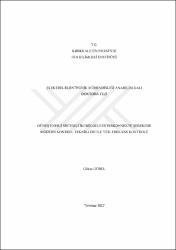Güneş enerji sistemli iki bölgeli enterkonnekte şebekede modern kontrol teknikleri ile yük-frekans kontrolü
Özet
Özellikle son on yıl içerisinde, hızla artan elektrik kullanımı ve mevcut enerji kaynaklarının sınırlı oluşu, enerji sektöründe çalışan bilim adamları ve sanayiciler tarafından farklı ve yeni kaynakları ortaya çıkarılmasına sebep olmuştur. Bu nedenle yenilenebilir enerji kaynaklarına olan ilginin daha da fazla artması kaçınılmazdır. Ancak güç sistemlerinde yenilenebilir enerji kaynaklarının kullanılması bazı problemleri ortaya çıkarmaktadır. Bu problemlerden en önemlilerinden bir tanesi Yük Frekans Kontrol (YFK) problemidir. Bu tez çalışmasında, güç sistemlerindeki YFK problemi için kontrol yöntemleri araştırılmıştır. Bu amaçla öncelikle geleneksel kontrol yöntemleri denenerek olumsuzlukları tespit edilmiş, sonrasında modern kontrol teknikleri ile geleneksel kontrol teknikleri belirlenerek yeni bir kontrolör tasarlanmıştır. Bu tez çalışmasında geleneksel PID, Bulanık Mantık Denetleyici (BMD), Genetik Algoritma (GA) ile ayarlanan Oransal-İntegral-Türev (PID) ve GA ile üyelik fonksiyonlarının düzenlendiği BMD kontrolörleri bir enterkonnekte güç sistemine uygulanmıştır. Bu amaçla genellikle literatürde tercih edilen iki bölgeli güç sistemine, günümüzde önemi ve sayısı artan Güneş Enerji Sistemleri (GES) eklenmiştir. Böylece uygulama yapılacak güç sistemi de yeniden tasarlanmıştır. Burada amaç, YFK'nın yeni bir kontrolör sağlanması sırasında sistemden kaynaklı elektriksel bozucuların yanında, güneş ışınımının ve GES güç çıkışının değişiminin YFK'yı nasıl etkilediğinin görülmesidir. Bu çalışmada önerilen GA-BMD, diğer kontrolörlerden daha iyi sonuçlar verdiği için bu tip sistemler için önerilmektedir. Especially in the last decade, the rapid increase in electricity use and the limited availability of available energy resources have led to the discovery of new and different sources by scientists and industrialists working in the energy sector. For this reason, it is inevitable that the interest in renewable energy resources will increase even more. However, the use of renewable energy sources in power systems poses some problems. One of the most important of these problems is the load frequency control (LFC) problem. In this thesis study, the control methods for the LFC problem in power systems were investigated. For this purpose, firstly the traditional control methods were tried and the adverse conditions were determined. After that, a new controller was designed by determining the modern control techniques and the traditional control techniques. In this thesis study, the proportional-integral-derivative (PID), Genetic Algorithm (GA), PID controller with GA and Fuzzy Logic controller with GA are applied to an interconnected power system. For this purpose, Solar Energy Systems (SES) has been added to the two-zone power system, which is generally preferred in the literature. Thus the power system to be implemented is also redesigned. The aim here is to see how the changes in solar radiation and SES power output affect the LFC as well as system-induced electrical disturbances during the provision of new controllers. GA-Fuzzy Logic Controller proposed in this study is recommended for such systems because it gives better results than other controllers.
















